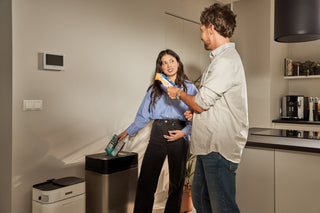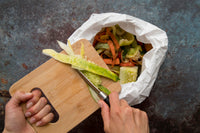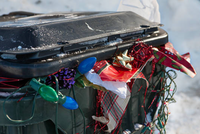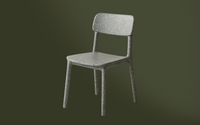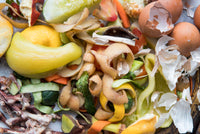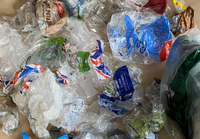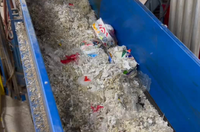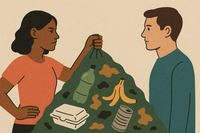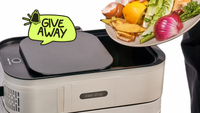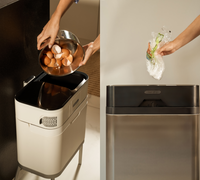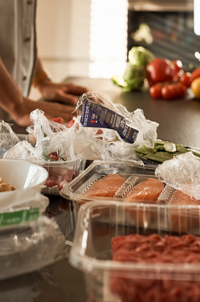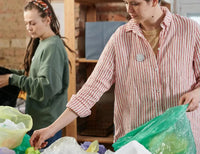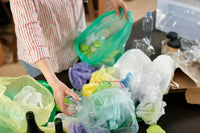Trash duties are the most underestimated part of modern household life—yet they’re one of the biggest sources of conflict. According to a Clear Drop survey of 800 U.S. adults living with partners, 1 in 2 couples argue about trash and recycling more often than childcare decisions. This article explores how waste management affects relationships, why soft plastic recycling is especially stressful, and what practical home tools can help restore fairness and reduce guilt while improving sustainability.
Trash duties spark more fights than childcare — 1 in 2 couples admit to arguing about trash, survey finds

While big parenting decisions or figuring out what's for dinner can stir up conflict, the real flashpoint in modern relationships might be taking out the trash. According to a Clear Drop survey, 52% of couples have argued about trash duties — more than about childcare.
While 30% of respondents said they don't argue about chores at all, the rest named garbage as one of the top 4 conflict triggers, right after cleaning, cooking, and laundry.

Why waste management gets no recognition
One reason for such contention? Trash and recycling are 6x less appreciated than cooking. We celebrate a home-cooked meal, but barely notice where the scraps go. We unwrap gifts with joy, then immediately forget about the packaging. Dealing with our trash is the final act of everything we consume, yet 72% of Americans say waste management doesn't feel like a valued task. Better systems reduce not only landfill waste but also stress at home.
Gender roles in waste and recycling tasks
According to the survey, 52% of respondents said the man usually takes out the trash — a rather visible chore. But behind that single action are numerous tedious tasks. At-home recycling involves sorting, rinsing, decoding triangle symbols, deciphering which plastics are accepted, which takeout containers are not, and whether a lid needs to come off a bottle.
Key findings on household waste division:
- 52% of men typically handle trash removal
- 54% of women handle recycling sorting and preparation
- Women perform 1.5x more invisible waste management tasks
In this way, recycling has become a mirror of domestic inequality: the visible gestures skew masculine, while the invisible tasks are seen as more feminine. Clear Drop solutions help rebalance invisible labor by simplifying preparation and recycling steps.
Why women feel more recycling guilt than men

The emotional weight of sustainability isn't shared equally, either. When asked if they'd ever felt guilty for throwing plastic in the trash without sorting it, 63% of respondents said yes. But the guilt also skewed sharply by gender: women are 1.5 times more likely than men to feel guilty about not recycling properly.
This emotional burden is particularly heavy when it comes to soft plastic recycling, where clear disposal options are often unavailable through traditional curbside programs.
Most people don't trust the recycling system

Even for those who do the sorting, they don't have much faith in the system. Over half of Americans (58%) say they're not confident their recycling actually gets recycled. Women are even more skeptical:
- 62% of women doubt their recycling efforts make it through the system
- 54% of men share similar doubts
It's a telling contradiction: The people doing more of the emotional and invisible labor are also the ones least convinced it matters. Their doubt has merit — in the U.S., only about 5% of plastic is successfully recycled. That’s why Clear Drop develops real soft plastic recycling solutions that connect household effort with proven downstream processing.

Why soft plastics are a hidden source of household stress
 When asked which type of waste feels hardest to manage at home, hazardous items like batteries and electronics topped the list, accounting for nearly 25% of all answers. Food waste came close behind at 24% — both categories stood out as the most frequently mentioned trouble spots across households.
When asked which type of waste feels hardest to manage at home, hazardous items like batteries and electronics topped the list, accounting for nearly 25% of all answers. Food waste came close behind at 24% — both categories stood out as the most frequently mentioned trouble spots across households.
Glass ranked third, with 17% of all answers. It's technically recyclable, but many cities have specific rules. People often wonder if they need to remove labels or if broken glass can be recycled or not.
For 13% of respondents, soft plastics (including wrappers, bags, mailers, and film packaging) were most difficult to manage. Since most of these materials aren’t accepted by curbside programs or specialty drop-offs, they often end up in the trash. With no clear path for disposal, soft plastics have become one of the biggest blind spots in household waste. Clear Drop’s soft plastic compactor is designed to remove this blind spot by turning tricky-to-recycle packaging into dense blocks ready for real recycling.
Paper and cardboard accounted for nearly 12% of answers, while cans and metal made up about 9.5%. In short, no category felt entirely frictionless, but hazardous and organic waste were flagged most often.
Less arguing, more efficient recycling
We live in homes that produce waste daily, yet most of us don’t know how to properly handle it, don’t believe our systems work, and don’t fully recognize the people who do the work anyway. While sustainability often feels like a personal responsibility, it’s also deeply social. It’s often shaped by how couples talk (or don’t talk) about fairness, trust, and what counts as “real work.”
Talking openly about waste — who handles it, who gets thanked, and what happens after it leaves our hands — is a first step toward shifting both habits and norms. It also means being honest about the gaps in the system: how confusing rules, broken infrastructure, and low transparency erode trust. Clearer guidance, better tools, and public solutions that match the effort people already put into recycling are the missing pieces.
Make Recycling a Source of Peace, Not Conflict
Clear Drop’s home solutions simplify waste management and reduce invisible labor.
Soft Plastic Compactor (SPC) compresses soft plastics into clean, compact 12×8×4-inch blocks that can be recycled through Clear Drop partners.
Organics Collector keeps food scraps odor-free and ready for proper composting.
See how Clear Drop creates a cleaner home and a cleaner world:
https://onecleardrop.com/pages/for-business
Frequently Asked Questions
Why is household waste such a common conflict source?
It’s daily, necessary, and rarely appreciated. When the work is invisible or unbalanced, tension builds quickly.
Why are soft plastics so frustrating to recycle?
Most curbside systems can’t handle them. They require extra steps—sorting, storing, mailing, or drop-off—which often fall on one person.
How does the SPC reduce household stress?
It eliminates sorting uncertainty and reduces storage volume up to 90%, making recycling simpler and more efficient.
Does Clear Drop ensure plastics are truly recycled?
Yes. Soft plastic blocks are sent directly to certified recycling partners and turned into new durable products.

